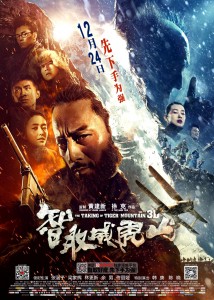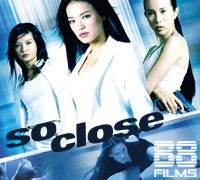Director: Tsui Hark
Cast: Zhang Hanyu, Tony Leung Ka-fai, Lin Gengxin, Yu Nan, Tong Liya, Kenny Lin, Gao Hu, Zhou Dong Yu, Han Geng, Chen Xiao, Mo Tse, Zha Ka, Li Bing-Yuan
Running Time: 141 min.
By Kelly Warner
Adapted from Qu Bo’s 1957 novel Tracks in the Snowy Forest, which is itself based on a true story, Tsui Hark’s The Taking of Tiger Mountain takes what sounds like another drama about China’s revolution following WWII and turns it into an entertaining action adventure instead. Tsui Hark thankfully shirks politics, preferring instead to just have a bit of fun. I don’t always agree with such an approach to historical events, but in recent years we’ve gotten a lot of historical action films from Asia that tried to be tragic and dramatic but came across as stuffy and dull instead. A movie that simply strives to entertain its audience is all right by me. And while it’s unlikely that The Taking of Tiger Mountain will ever be considered one of Tsui Hark’s finest films, it is one of the director’s most entertaining pictures made in the past decade or more.
The film takes place in the year following Japan’s surrender in WWII. In chilly Northeast China, the villainous Lord Hawk and his army of bandits were taking over territories, driving the villagers towards starvation. A small squad of the People’s Liberation Army moves in to help the villagers and end Hawk’s reign. But Hawk has put himself in a position where he cannot be easily defeated. He resides in a fortress atop Tiger Mountain, surrounded on all sides by treacherous rock and ice. In order to get into the fortress, the PLA sends one of their own into Hawk’s midst to gain his trust and sabotage the defenses.
As filmed by another director, The Taking of Tiger Mountain might’ve been a gritty film about war and revolution. However, Tsui Hark gives the action a giddy sense of excitement and adventure. And because the action forms the backbone of Tiger Mountain, that excitement is shared with much of the rest of the film as well. There’s a sequence half-way through the movie when a town is attacked by machinegun toting bandits on skis. At one point during this sequence, a grenade explodes over the bandits, and Hark stops the frame, rewinds it to watch the grenade put itself back together, spins the camera around to a new angle, and watches it explode again. The film has plenty of flaws, but when it’s working it’s a blast.
Hark’s Detective Dee films reminded me a bit of Guy Ritchie’s Sherlock Holmes series (and I still say that fans of one series should check out the other). I think there’s a similarity between Ritchie’s Sherlock films and Tiger Mountain as well. This time it’s not similar stories and heroes, but rather a similar use of style. During some of Tiger Mountain’s action we get these moments where the action slows to a stop, the camera revolves around a bullet, then the camera rushes off to where the bullet will land before time is allowed to continue. In Ritchie’s Sherlock Holmes films, this stylistic device was often used to depict the master detective’s ability to focus during action. Here Hark uses the technique just because it looks cool. And that’s fine, I think. It gives the action a little something different. Right before it starts feeling like overkill Hark stops using the technique and switches to something else, keeping things fresh.
It’s clear that the director and much of the cast are having fun with the movie. In the role of Lord Hawk, Tony Leung Ka Fai gets the chance to play what is essentially a goofy Bond villain. Hawk lives in a super fortress in the snowy mountains, he desires power above all things, he keeps a dangerous hawk as a pet, and his men are crazy loyal and all have names like Bro 6, Bro 7, and Bro 8. Tony Leung Ka Fai is nearly unrecognizable beneath prosthetic makeup and a whispery villain voice. It’s a fun performance and easily the best character in the film.
The PLA squad is a group of uninteresting, self-sacrificing heroes that blend together because they’re all pretty much interchangeable do-gooders. When will writers learn that hero worship often results in boring characters? The only standout character from their bunch is Yang, as played by Hanyu Zhang (Back to 1942). Yang spent time among bandits in the past and their ways have rubbed off on him, making him the odd duck in the squad but the perfect man to infiltrate Hawk’s bandits. Much of the film has the bandits putting Yang through trials to prove his loyalty. It’s in these scenes that we don’t mind that bullets aren’t flying, because Hawk and Yang are the interesting characters, and Leung and Zhang are both actors fully capable of bringing the drama to life. When we’re left to spend time with the rest of the PLA the film buckles a bit. Tiger Mountain is the sort of film where you kinda root for the bad guys because at least they’re entertaining to watch.
The Taking of Tiger Mountain was filmed in 3D and it’s clear that’s the format the filmmaker’s intended you watch it in. Throughout the film Hark throws bullets, blood, chunks of an ear, and more at the audience in an attempt to go for the 3D wow factor. I watched the film in 2D, the only format available on Well Go USA’s otherwise very impressive looking Blu-ray. I think the film looks fine in 2D, but those shots that were obviously designed with 3D in mind are hard to miss.
One of Tsui Hark’s most surprising choices is to bookend the film with scenes set in 2015. In these scenes, a young man watches bits of the 1970 Peking opera adaptation, Taking Tiger Mountain by Strategy. It may be an unnecessary addition, but it adds a bit of whimsy to the film, something that is present in a lot of Hark’s movies. Others may disagree about the 2015 sections in the film, but I liked them.
I did not like how Hark chose to end the film, however. As the credits are about to begin, the film stops and goes, ‘Oh, by the way, there was supposedly an airstrip at Hawk’s base. I wonder how that might’ve impacted the final showdown…’ Though all the various conflicts have been resolved by now, we’re treated to an additional action sequence that pretends that earlier climax never happened. What it feels like is an alternate ending that should’ve been left as a DVD extra but instead has somehow wormed its way into the final cut because the director apparently didn’t know he’d already done a good enough job ending his movie.
I should take a full grade off for that unnecessary sequence… but in the end I enjoyed my time watching Tiger Mountain and I don’t want to discourage viewers from giving the film a chance. One could easily say that Hark was having too much fun with his movie and simply didn’t know when enough was enough. It’s a frustratingly flawed film, but there’s still a great deal to enjoy.
Kelly Warner’s Rating: 7/10





Good review…I’m patiently waiting for the HK DVD of this to hit and pick it up. Almost anything that has Tsui Hark in the directors chair is worth checking out, and he’s been on a roll since 2010’s ‘Detective Dee and the Mystery of the Phantom Flame’.